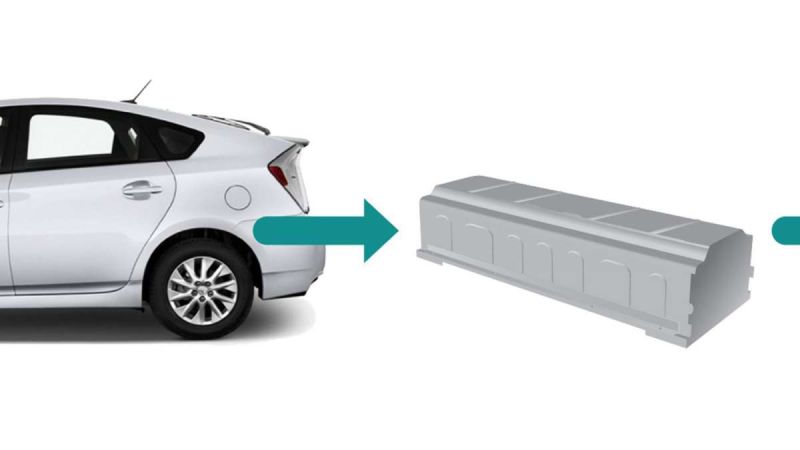If you are a Toyota Prius driver chances are you have thought about many different ways to get the most out of every drop of fuel. What if the answer to the Prius is not fuel economy but the battery capacity and how much energy can be stored onboard.
If you are also a Prius owner that has had traction battery trouble then you will really appreciate this guy who has pretty much solved your problem. Trevor Jackson of England has successfully made a battery that is cheaper, more energy-dense, and eco-friendly.
Here is what the new battery is and how it could change the way we drive our Prius cars, forever.
What Our Prius Uses Today For Batteries
Two current battery technologies that are in Prius are nickel-metal hydride and lithium-ion. Both types of technology have served us well all these years. Both have great strengths but also weaknesses that make them a great bridge to the next best thing.
Nickel-metal hydride has been a Prius staple since 1997. It is based on nickel-cadmium batteries that were robust but fell, victim to dreaded memory wear. Nickel-metal hydride was supposed to be the solution to that problem and initially, it was. It worked great until years down the road when it too began suffering the same fate. Even though there are solutions to repair these type of batteries today, they still are not nearly as energy-dense or reliable as lithium-ion, also they are much heavier. This makes them a less than desirable technology.

Lithium-ion has been very promising, but not without limitations as well. This technology brought us a lighter and more power-packed energy source that has brought the electric car back into reality. Prius began using this back in 2012 with the first Prius plugin. Tesla had been using lithium-ion since its inception in 2008, but Toyota firmly believed that the battery technology needed more research before it could really be fully utilized.
Watch 3 reasons you should consider selling your Toyota Prius and click to subscribe to Torque News Youtube channel for daily automotive news and analysis.
Both batteries have given us so much data over the years and been great. but they have had some serious limitations as well. The industry has been struggling to find a new solution to this problem and until now there has not been a solid answer. Enter Trevor Jackson.
Aluminum-Air Fuel Cell Battery Could Power A New And Old Prius
Trevor and his company had made this battery over 10 years ago. Companies that are lithium-ion supporters have fought against this as it would make their technology obsolete.
This battery is also safe for the environment which Jackson proved by drinking some of the formulae. Not only that but recycled beverage cans can be used as well to make this battery. Eco-friendly is what the Toyota Prius has always been about. Trevor is hoping that kits can be used to retrofit cars like the Prius and give them a range that would make them even more efficient. Kits costing around $4000 could easily turn a hybrid into a plugin and give it a range that would run it right along with a Tesla.
Telsa could even benefit as well. According to the team, the same size of the battery a Tesla Model S has currently with this new technology could give it a range of 1500 miles. This is a huge win for the electric car world, and could even change the way we use 12v systems too.
Conclusion
I hope this pulls through for us Prius owners. It would be so awesome to drop an aluminum-air battery in my 07 and watch the fuel mileage stack up. I cannot wait to see where this technology will take us here in the next few years.
Thanks for reading, be sure to check out my other story, These 3 recalls may be affecting your Toyota Prius or Lexus CT200h
Also Watch New tech means more MPG from your Toyota Prius and Click to Subscribe to Torque News Youtube Channel for Daily Toyota Prius and Automotive News.
Peter Neilson is an automotive consultant specializing in electric cars and hybrid battery technologies. He is an automotive technology instructor at Columbia Basin College. He holds a Bachelor of Science in Automotive Service Technology from Weber State University. Peter is also an Adjunct Instructor of automotive technology at Columbia Basin College. Peter can be reached on Linkedin and you can tweet him at The_hybrid_guy on Twitter.
Set Torque News as Preferred Source on Google












Comments
Well if your goal was to get
Permalink
Well if your goal was to get your readers to look up Trevor Jackson and his battery, then you succeeded, at least with me. You teased some potential uses and big benefits of this new battery technology without mentioning anything specific about the technology, or it's capabilities, or cost. On the good side, it appears that this air-aluminum battery/fuel cell technology seems to be tested and real, as opposed to a pipe-dream or scam. But because they have not built any production batteries based on Jackson's electrolyte technology yet, and they are keeping the details of the technology a secret, much is still unknown. But apparently he was able to convince Austin Electric to invest millions into the technology, which comprises an existing aluminum-air battery with his special (and secret) non-toxic electrolyte fluid that will supposedly power a large automobile battery for 1500 miles. The biggest part of this design that would get some push-back is that this battery design is NOT rechargeable. Now the battery companies would just love this sales model, where they can sell replacement batteries at any retail store. And potentially any battery swap would be simple for your average consumer to perform in seconds/minutes. The good side of this model is that the batteries are recycled and there are no toxic or expensive materials that have been plaguing batteries for decades. The downsides for me is that even though I have a much smaller storage capacity in my car's Lithium battery, I can easily recharge it daily, and I plan to add solar soon, so I will be running on renewable energy, as opposed to being beholden to the pricing of a single supplier and retailers who can control future battery prices. It sounds like the proposed pricing of this design would be a very good fit for electric bikes, scooters, and other small devices. But for cars the guess on pricing would put it at about half of Britain's current gasoline costs, but that means that it's about the same price to buy the recycled batteries as it costs for gas in the U.S. And that price is about 4X the cost of recharging car batteries at home (when done off-peak hours). So it sounds like they are right on target building the first batteries for tuk-tuk vehicles, bikes, scooters, etc.. and once they show that the technology works well on smaller vehicles (and is cost effective) then they could move forward to larger automotive uses. I hope that the business and technology pans out as planned, but I will reserve judgement until I see real batteries, running small vehicles, and perhaps retrofit kits installed. So, as with other cool EV technology rumors that I read about daily, I am both excited and skeptical, awaiting more news on future developments.
Aluminum Air batteries are
Permalink
Aluminum Air batteries are not rechargable, so not at all a good replacement
Aluminum-air batteries are
Permalink
Aluminum-air batteries are primary batteries and cannot be recharged. How do you turn a hybrid into a plug-in if you can't recharge the battery?
Yeah, that's not going to
Permalink
Yeah, that's not going to happen. You missed a big detail about aluminum-air batteries. They are Not Rechargeable. The original article in the Daily Mail is confusing on this point, but if you read the last 3 paragraphs it becomes clear. I quote:
"Instead of a vast network of charging points, all that is necessary are stores where cells can be swapped, just as people already swap propane gas bottles.
Swapping a battery, says Jackson, takes about 90 seconds.
He and Corcoran say they are in 'advanced discussions' with two major supermarket chains to provide this facility."
um, but an aluminum air
Permalink
um, but an aluminum air battery cannot be recharged, so......
I am glad you are trying to
Permalink
I am glad you are trying to help us with the batter. I would be glad if you explain to me how much it costs and the way it works out. Thank you
Put me down for purchasing
Permalink
Put me down for purchasing the first one
There are currently no
Permalink
There are currently no rechargeable aluminium air batteries, but they're working on that. Right now, though, the recharging process leads to both degradation of the metals as well as by-product accumulation of other components on the metal plates. Also, aluminium air batteries lose their charge super quickly when stored in an active state. The means once you put that battery in and start using it, you need to keep using it or you're wasting power. People have been working on ways around this (oil and water flushes to deactivate/activate the battery during stop times and try and limit its power loss), but those very same methods for reducing power loss hamper rechargeability. It will be a while before these become efficient long-term energy storage devices, I think.